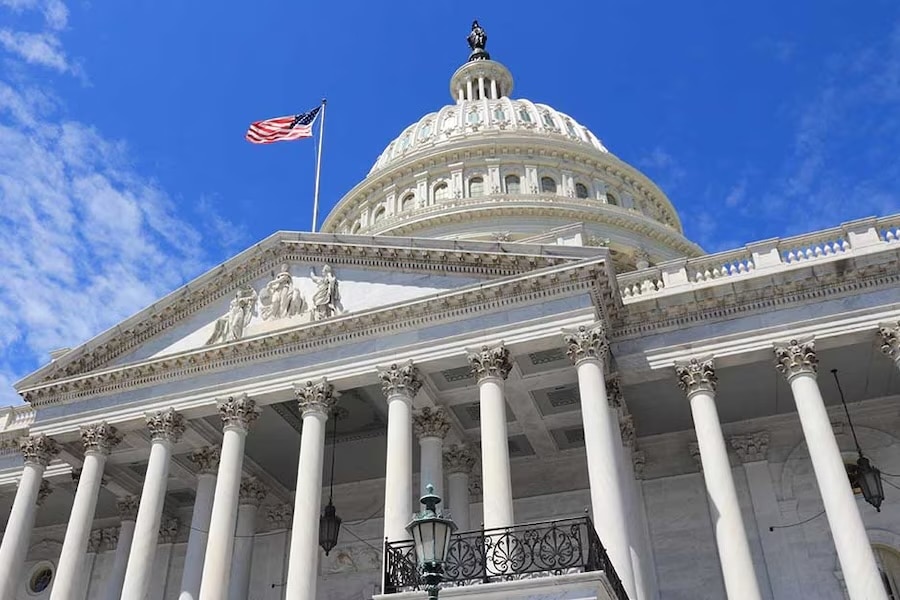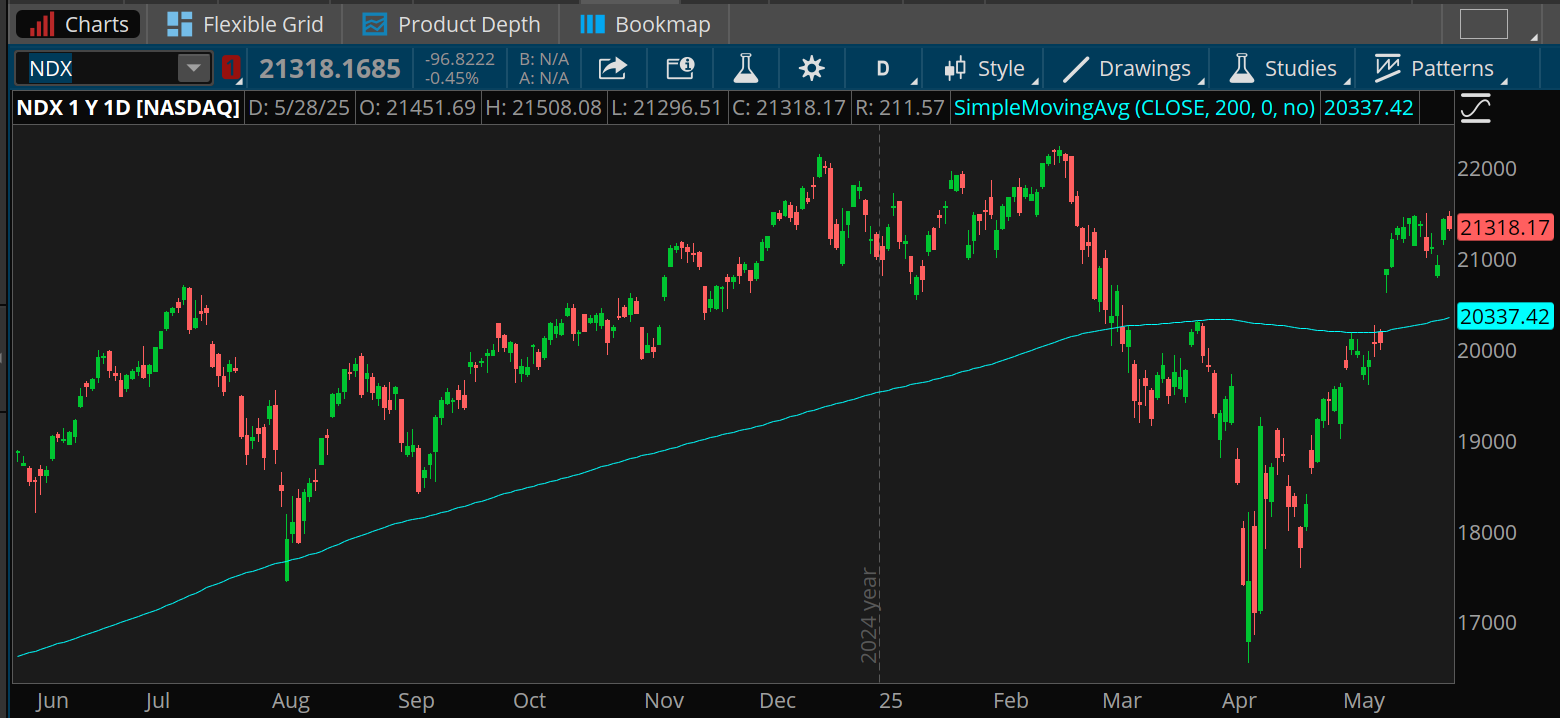Schwab Market Update
Stocks Up on Anti-Tariff Ruling, Nvidia Results

Published as of: May 29, 2025, 9:16 a.m. ET
Listen to this article
Listen here or subscribe for free to the Schwab Market Update in your favorite podcast app.
| The markets | Last price | Change | % change |
|---|---|---|---|
| S&P 500® index |
5,888.55 |
-32.99 |
-0.56% |
| Dow Jones Industrial Average® |
42,098.70 |
-244.95 |
-0.58% |
| Nasdaq Composite® |
19,100.94 |
-98.23 |
-0.51% |
| 10-year Treasury yield |
4.47% |
Unch |
-- |
| U.S. Dollar Index |
99.73 |
-0.15 |
-0.15% |
| Cboe Volatility Index® |
19.24 |
-0.07 |
-0.01% |
| WTI Crude Oil |
$61.93 |
+0.09 |
+0.15% |
| Bitcoin |
$108,545 |
+$1,210 |
+1.12% |
(Thursday market open) A court ruling invalidating many of President Trump's tariffs injected fresh vigor on Wall Street early Thursday, but it's likely just another twist in a long road for the trade war. The administration has already said it would appeal and may have other avenues to pursue its policies. Even before the ruling from the U.S. Court of International Trade, the market received a shot of adrenaline from Nvidia's (NVDA) earnings late yesterday.
Nvidia's results narrowly beat Wall Street's thinking, and at least for now investors appeared to look past disappointing guidance from the AI chip giant. The company's results and forecast would have been rosier if not for U.S. export restrictions on China that forced Nvidia to stop sales of its H20 chip there, costing it about $2.5 billion in revenue last quarter and taking a bite out of margins. But instead of focusing on the H20 news, which was already widely known, investors cheered Nvidia's annual data center revenue growth of 73%, more evidence that AI chip demand continues to impress.
Data this morning painted a mixed picture. The government's second estimate of first quarter gross domestic product (GDP) inched up to –0.2%. Investors had expected a repeat of the –0.3% GDP growth seen in the government's first estimate last month. The quarterly GDP deflator—an inflation monitor—was unchanged at 3.7%. Initial jobless claims jumped to 240,000, about 10,000 above expectations. That's above the near-term average, but one week isn't a trend. On GDP, "details under the surface suggested some weakness, with personal consumption revised down to a 1.2% annualized from 1.8%, while inventory build was a bit higher than expected as businesses prepared for tariffs," said Collin Martin, director, fixed income strategy at the Schwab Center for Financial Research. "Bond yields declined following the release as softer economic data could pull forward the rate cut timeline. We still expect one or two rate cuts by year-end, with the first likely coming in September."
To get the Schwab Market Update in your inbox every morning, subscribe on Schwab.com.
Three things to watch
- More context on anti-tariff court ruling: If yesterday's ruling striking down tariffs holds up, it would eliminate 30% tariffs on Chinese imports, 25% tariffs on Canadian and Mexican tariffs, and 10% tariffs on most other goods entering the United States. But it also raises questions. For instance, can the negotiations on trade between the U.S. and its partners continue now that this ruling has invalidated the tariffs they're negotiating? "The decision will be appealed, first to the U.S. Court of Appeals and then potentially the Supreme Court," said Michael Townsend, managing director, legislative and regulatory affairs at Schwab. "So, this is definitely not over. Even before this particular ruling, I think there was a sense among investors that the tariff fever was slowing, though there was a lot of angst and interest about what July 9 would bring—because that's the date when the 90-day pause on the reciprocal tariffs ends. What this decision does is add a new element of uncertainty to the already confusing tariff landscape."
- Inflation data may be benign: Stay tuned tomorrow for the inflation report most closely followed by the Federal Reserve: the Personal Consumption Expenditures (PCE) price index. It's due at 8:30 a.m. ET Friday and analysts expect benign readings of 0.1% month over month for both headline and core PCE (core excludes volatile food and energy). This week's data parade concludes later tomorrow with University of Michigan final consumer sentiment reading for May. The average analyst estimate of 50.8 is unchanged from the preliminary May reading—one of the lowest in history. However, a brighter consumer confidence number earlier this week could underpin ideas that "soft data" like sentiment might have improved as consumers saw tariff deadlines extended. As always, check the report's inflation expectations, which skyrocketed this spring.
- Sectors closely tied to economic trends outpace: The long rally since April's tariff-related Wall Street descent embraces most S&P 500 sectors, but growth areas outpace the overall market. Much of the "buy the dip" action was most evident lately in sectors like consumer discretionary, info tech, and communication services, while industrials continue to hold up well and are second behind info tech in performance over the past month. This hints that investors are bullish about economic growth despite trade worries, as industrials are one of those sectors like the others mentioned that tend to do better when there's a strong economy. Industrial giants like Caterpillar (CAT), Deere (DE), U.S. Steel (X), and Honeywell (HON), are all up sharply the last few weeks. Though higher U.S. and foreign yields triggered recent concern that borrowing costs might rise and slow demand from consumers and businesses, the positive view is that higher long-term yields could reflect hopes for stronger economic growth. Home builders, semiconductor firms, and travel companies were also strong early this week, and if this trend lasts it may suggest trade concerns continue to ease as tariff deadlines keep getting pushed back.
On the move
- Nvidia climbed 5.5% in pre-market trading after impressing with its overall results despite the guidance miss related to China exports. Technical resistance could be near $140, a mark the stock has bumped against many times in the past. Going back to earnings, the gross margin hit looks like a temporary setback in that important category. Gaming revenue surged, quarterly sales of the company's new Blackwell chip impressed analysts, and CEO Jensen Huang told CNBC that demand "is just incredible."
- Other chip stocks climbed this morning, drawing strength from the strong demand cited by Nvidia. Shares of Broadcom (AVGO), Advanced Micro Devices (AMD), and Arm Holdings (ARM) all rose.
- Apple (AAPL) climbed 1.8% in pre-market trading, likely helped by the court ruling on tariffs. Apple is one of the U.S. companies suffering the most impact from tariffs against China, a major manufacturing hub and a large market for the company.
- Salesforce (CRM) slipped 0.25% in pre-market trading despite beating analysts' revenue and earnings expectations late yesterday. Shares had initially risen on the news. Revenue climbed 8% annually to $9.8 billion, a record, while closely monitored subscription and support service revenue climbed 8%. Salesforce now expects a currency "tailwind" from a weakening U.S. dollar. It raised its full-year revenue guidance and released second quarter guidance above Wall Street's estimates.
- HP (HPQ) plunged 10% before the open as earnings and guidance fell short of analysts' expectations. The company did report quarterly revenue in line with Wall Street's forecasts but missed the FactSet EPS consensus by $0.09.
- Best Buy (BBY) fell 2.54% after earnings beat analysts' expectations and revenue came in as expected. However, the company lowered its fiscal year guidance based on the tariff impact. It's the latest of a host of retailers to do so.
- Bitcoin (/BTC) and other cryptocurrencies rallied again this morning, with bitcoin up 1.3%. This came as gold—another alternative investment—hit a one-week low following the court ruling against Trump's tariffs. The 2025 Bitcoin Conference in Las Vegas this week is still going and could mean headlines as different crypto-related firms make announcements.
- Bond yields inched higher despite decent demand seen yesterday in a $70 billion auction of U.S. 5-year Treasury notes. The auction "went well despite ongoing debt and deficit concerns," said Kathy Jones, chief fixed income strategist at Schwab. The rise in yields this morning briefly back above 4.5% for the 10-year could reflect economic optimism related to the anti-tariff court ruling. A 7-year note auction is on tap today and could be watched for more demand clues. Yields slipped after GDP, however.
- As of early Thursday, futures trading indicated just a 2% chance of a Fed rate cut in June, and 22% in July, according to the CME FedWatch Tool. The July odds have been flagging over the last week, and analysts now see a better than 40% chance of rates staying unchanged even at the September meeting.
More insights from Schwab

Next steps in the Senate: The budget bill may undergo significant changes. "Some senators would like to see larger spending cuts, while others are concerned about the impact of Medicaid and SNAP cuts to low-income residents in their states," said Michael Townsend, managing director, legislative and regulatory affairs at Schwab, in his latest analysis.
" id="body_disclosure--media_disclosure--118631" >Next steps in the Senate: The budget bill may undergo significant changes. "Some senators would like to see larger spending cuts, while others are concerned about the impact of Medicaid and SNAP cuts to low-income residents in their states," said Michael Townsend, managing director, legislative and regulatory affairs at Schwab, in his latest analysis.
Chart of the day

Data source: Nasdaq. Chart source: thinkorswim® platform.
Past performance is no guarantee of future results.
For illustrative purposes only.
Nvidia's earnings yesterday put the tech-heavy Nasdaq-100® (NDX—candlesticks) on center stage today, with possible ramifications for the entire index due to Nvidia's huge market capitalization. While the NDX has recovered dramatically from April's tariff-weakened lows and now trades above its 200-day moving average (blue line) after several months below it, the index hasn't made much progress this month testing its all-time highs posted in February or even the highs from late last year. Weakness in stocks like Apple and underperformance by semiconductors since last summer continue to keep the NDX from gaining much traction, and it's now roughly flat year to date.
The week ahead
Check out the Investors' Calendar for a summary of the top economic events and earnings reports on tap this week.
May 30: April Personal Consumption Expenditures (PCE) price index and final May University of Michigan Consumer Sentiment.
June 2: May ISM Manufacturing PMI®, April construction spending, and expected earnings from Campbell Soup (CPB).
June 3: April factory orders, April Job Openings and Labor Turnover Survey (JOLTS), and expected earnings from Dollar General (DG), CrowdStrike (CRWD), and Hewlett Packard Enterprise (HPE).
June 4: May ISM Services PMI® and expected earnings from Dollar Tree (DLTR).
June 5: ECB rate decision and expected earnings from Broadcom (AVGO), Ciena (CIEN), lululemon (LULU), and Petco (WOOF).